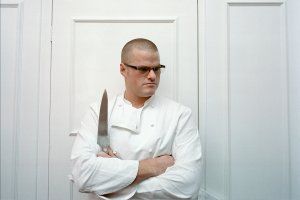
Among the super-skilled of haute cuisine, Heston Blumenthal is a rare breed. One of the first champions of science-based gastronomy, he astonished—and charmed—diners with concoctions such as snail porridge and egg-and-bacon-flavored ice cream, and became one of youngest chefs to win three Michelin stars. The Fat Duck, his first restaurant, which he opened when he was 29, was named best restaurant in the world in 2005 by Restaurant Magazine after an international poll of fellow chefs and critics.
Located in the village of Bray beside the Thames, the restaurant gets more than 20,000 calls daily from would-be patrons, and Blumenthal has turned difficult food into a global brand with mass appeal. Millions watch his cooking shows, and his cookbooks routinely figure high in the bestseller lists. Last year a Christmas pudding he created retailed on eBay for $1,500 after selling out in stores.
Yet the chef's early résumé is a curious blank, a notable absence of cooking schools and formal training. While future rivals slaved to perfect their soufflés, the young Blumenthal worked as a debt collector, a photocopier salesman, and a credit controller for his father's business. His first paid job as a chef, aside from a single week as a teenage trainee, came when he opened the Fat Duck.
Now, at 44, he's launching his first London restaurant. Situated in the five-star Mandarin Oriental hotel and featuring matchless views of Hyde Park, Dinner is a $10 million restaurant where Blumenthal cooks food not from the future but from Britain's distant past. He is creating interpretations of such long-forgotten treats as rice and flesh (circa 1390), orange buttered loaf (1630), and ragout of pigs' ears (1750).
So far, the press has been lavish with superlatives. "A historic culinary wonderland," The Guardian called it; "Bloody lovely," The Observer enthused. As at Bray, critics see qualities in the cooking that go far beyond experimentation for its own sake. And there's no keeping diners away. The next free table is in midsummer.
Not bad for someone without a dash of formal instruction who grew up in a country then famously indifferent to the charms of fine dining. "My mum was a good cook. But I didn't know what an oyster was like when I was in my teens," Blumenthal tells NEWSWEEK. "There was only one type of pasta in the supermarket—that was spaghetti—and you had to go to the [drugstore] for olive oil: it was poured into your ear as a medical aid."
His own moment of revelation came while on holiday in France with his parents and the chance decision to try out a smart eatery in Provence. Every detail remains clear in his memory, from the sommelier's handlebar mustache and leather apron to the crunch of the waiters' footfalls on the gravel, and his own selection, red mullet with a sauce vierge. The 16-year-old Blumenthal was entranced. "It was like falling down a hole into Wonderland."
In the years that followed, he devoured the works on classic French cuisine while working a range of jobs to sustain his habit and fund an annual culinary pilgrimage. "Every year I saved and saved and saved, and then my wife and I would blow a six-month wage on a two-week trip to France, where we would drive around visiting winemakers, cheesemakers, and so on."
Just as important, he found inspiration in the work of American academic Harold McGee's On Food and Cooking: The Science and Lore of the Kitchen. Without the inhibitions of formal training, Blumenthal felt free to challenge the orthodoxies. "I just didn't know the constraints," he says. "Naiveté is a fantastic thing."
By 1995, Blumenthal was ready to put the precepts into practice, acquiring the Fat Duck, a 450-year-old pub in a quaint village within easy driving distance of London. By his own estimation, he averaged 120-hour workweeks during the early days. But it didn't take long for the accolades to arrive. The restaurant's first Michelin star in 1998 was followed by a second and third over the next six years.
The well-known perfectionism comes at a price. With wine, the tasting menu costs $255, not including service. But then the ratio of chefs at the Fat Duck is the highest in the country, with 50 chefs cooking for a maximum of 42 diners. And although it makes no economic sense, Blumenthal wants to up the ratio by reducing the number of diners. "It just gives us that much more space," he says by way of explanation.
Although few viewers of his TV shows have the skill or kitchenware to create such signature dishes as salmon poached in licorice gel or popcorn ice cream, Blumenthal is immensely popular, perhaps because his charm is much more down-to-earth than his cooking. Granted, his looks help, too. With his close-shaven head, space-age spectacles, and a chef's jacket pulled tight over a barrel chest, he appears a bruiser-scientist with a hint of geek as he wields the blowtorch and liquid nitrogen for his culinary creations. Although his own scientific credentials are limited (he failed chemistry at school), he maintains a passion for innovation. At any time, his research teams at three development kitchens in Bray are working on 600 new dishes. It's this Willy Wonka approach to cooking that has come to define Blumenthal, and he's not sorry. "I love the wacky-scientist bit and any reference to Wonka because I am really just a big kid."
Uncommon Knowledge
Newsweek is committed to challenging conventional wisdom and finding connections in the search for common ground.
Newsweek is committed to challenging conventional wisdom and finding connections in the search for common ground.





